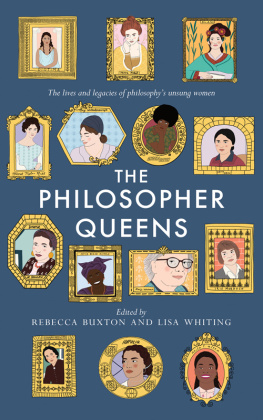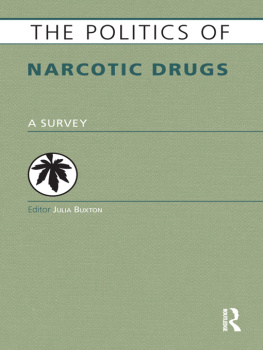Rebecca Buxton - The Philosopher Queens
Here you can read online Rebecca Buxton - The Philosopher Queens full text of the book (entire story) in english for free. Download pdf and epub, get meaning, cover and reviews about this ebook. year: 2020, publisher: Unbound, genre: Science. Description of the work, (preface) as well as reviews are available. Best literature library LitArk.com created for fans of good reading and offers a wide selection of genres:
Romance novel
Science fiction
Adventure
Detective
Science
History
Home and family
Prose
Art
Politics
Computer
Non-fiction
Religion
Business
Children
Humor
Choose a favorite category and find really read worthwhile books. Enjoy immersion in the world of imagination, feel the emotions of the characters or learn something new for yourself, make an fascinating discovery.
- Book:The Philosopher Queens
- Author:
- Publisher:Unbound
- Genre:
- Year:2020
- Rating:3 / 5
- Favourites:Add to favourites
- Your mark:
- 60
- 1
- 2
- 3
- 4
- 5
The Philosopher Queens: summary, description and annotation
We offer to read an annotation, description, summary or preface (depends on what the author of the book "The Philosopher Queens" wrote himself). If you haven't found the necessary information about the book — write in the comments, we will try to find it.
The Philosopher Queens — read online for free the complete book (whole text) full work
Below is the text of the book, divided by pages. System saving the place of the last page read, allows you to conveniently read the book "The Philosopher Queens" online for free, without having to search again every time where you left off. Put a bookmark, and you can go to the page where you finished reading at any time.
Font size:
Interval:
Bookmark:

For our sisters
With special thanks to Carole Edmond for generously supporting this book
M ost people dont think of Platos Republic as a work of feminist philosophy. But when Plato proposed that women, as well as men, were capable of leading the ideal city-state, he was thinking far ahead of his time. Plato argued, through the voice of Socrates, that talented and intelligent women should be chosen to work alongside men as Guardians. These Philosopher Kings, as they are often called, would rule over the Republic, providing perfect philosophical enlightenment and bringing harmony to the city.
Over 2,000 years later, you would forgive people for assuming that men have been doing most of the philosophy since then. Women do not seem to have fulfilled Platos prediction that they too could become great thinkers. Or, at least, thats how todays philosophy books make it look.
The history of philosophy has not done women justice. To see this, you only have to look at some of the recent books published on the topic. In Philosophy: 100 Essential Thinkers only two women feature, with Mary Wollstonecraft and Simone de Beauvoir taking the seats of honour. In The Great Philosophers: From Socrates to Turing , no women made the cut. Each chapter in that particular book was written by a contemporary philosopher, all of whom are also men. At the time of writing, a newly published book by A. C. Grayling, boldly titled The History of Philosophy , includes no sections on women philosophers. The book does include a three-and-a-half-page review of Feminist Philosophy in which only one woman philosopher Martha Nussbaum is mentioned by name. Youre beginning to sense a theme.
Its important to note that this gap is not due to a lack of books being published about philosophy generally. On the contrary, accessible texts are being written on an incredibly broad range of topics, such as Golf and Philosophy: Lessons from the Links , Aristotle and an Aardvark Go to Washington , and last but certainly not least, Surfing with Sartre . And yet, very little has been written to celebrate the work of great women philosophers. One notable exception was written by a great philosopher herself, Baroness Mary Warnock, who wrote Women Philosophers over twenty years ago.
It is of course true that women have been under-represented in philosophy, and indeed most of academia, because they were historically excluded from education. The first four women in the UK to receive degrees in any subject graduated in 1880 from University College London. The University of Cambridge was the last British institution to allow women to take full degrees, in 1948. This institutional exclusion meant that women were prescribed roles in society that kept their thinking, and their freedom, to a minimum.
But this is 2019 and things have certainly improved over the past century. More women are taking degrees in philosophy than ever before, with most universities now seeing higher numbers of women than men in their undergraduate classes. In spite of this progress, there is still a huge gender disparity higher up in the pecking order. There are very few philosophy departments where women make up anywhere near 50 per cent of faculty staff. In 2015, women accounted for only 22 per cent of philosophy professors at the twenty top US universities. In some fields of philosophy, there has been almost no increase in the number of women since the 1970s. So, even though more young women are taking their first dive into the mans world of philosophy than ever before, this is not quickly translating into more at the top. Where some women have secured lectureships and professorships, an overwhelming number of them are white. Non-white women are still hugely under-represented in philosophy, with very few senior positions filled by people from minority backgrounds. In her New York Times interview, The Pain and Promise of Black Women in Philosophy, Professor Anita L. Allen noted that only 1 per cent of full-time philosophy professors in the US are Black, whilst around 17 per cent are women.
When the two of us were studying philosophy at university, we knew that women were under-represented in our discipline. Both of us had only a handful of women lecturers, and our lessons were dominated by men from hundreds of years ago, as well as the men standing before us. A typical philosophy syllabus will likely feature very few or no women, with the focus instead being on the philosophical canon. That is: Plato, Aristotle, Descartes, Hobbes, Locke, Hume, Rousseau, Kant, Mill, Nietzsche, Sartre and Rawls, to name only a few. Women are often only mentioned briefly, perhaps in reference to a male counterpart with whom they worked or had a relationship, or (if youre lucky) as part of a single Women in Philosophy module. When attempts are made to diversify the curriculum to include other important philosophical voices, this is often accompanied by a media outcry over snowflake students and lecturers.
Despite these frustrations, there is much cause for hope. Outstanding work is being done in academic philosophy to reclaim the history of women philosophers and ensure that their voices and perspectives are preserved for the next generation of thinkers. The New Narratives in the History of Philosophy group and Project Vox both showcase the work of women philosophers from the early modern period, 15001800. The Society for Women in Philosophy (SWIP) runs events and mentoring programmes aimed at promoting women in philosophy, past, present, and future. The Centre for the History of Women Philosophers and Scientists at Paderborn University, Germany, runs an annual summer school, teaching students about the great contribution that women have made to the history of thought. The In Parenthesis project at Durham University explores and archives the work of the Oxford four: Mary Midgley, Iris Murdoch, Elizabeth Anscombe and Philippa Foot. This year has also seen the publication of Becoming Beauvoir by one of our own authors, Kate Kirkpatrick. All of this work is helping to break down barriers for women in philosophy today, by showing that women in this field are far from new. We have, in fact, been philosophers all along.
There is still a long way to go to change popular perceptions of philosophy. When creating our promotional video for this book, we asked members of the public to name as many philosophers as they could. When they all listed the usual suspects, we asked whether they could name any women philosophers. None of the people that we surveyed could name a single one.
This book is an attempt to change these perceptions. In the pages that follow, we intentionally adopt a broad definition of philosopher as we believe that part of the reason why women have historically been excluded from our discipline is because many of them have instead been considered activists or learned ladies. This has led to a prevailing image of the white male philosopher thinking from his armchair. Instead, its time to recognise the clear intellectual rigour, questioning and insight that makes these women worthy of the philosopher title.
The authors and subjects in this book come from many different backgrounds with their own unique ideas, experiences and histories. The philosophers written about here are complex, challenging, often inspiring, and sometimes deeply problematic. However, they all contribute an important element to our understanding of philosophy. Some of them you will have heard of, or perhaps studied. Others you might encounter here for the first time. You can enjoy this book by simply selecting chapters that pique your interest or following along chronologically; the choice is yours. There have, of course, been many women whom we have not been able to include. You can find a list of other women philosophers in the More Philosopher Queens section at the back of the book. We encourage you to explore their lives and work for yourself.
Next pageFont size:
Interval:
Bookmark:
Similar books «The Philosopher Queens»
Look at similar books to The Philosopher Queens. We have selected literature similar in name and meaning in the hope of providing readers with more options to find new, interesting, not yet read works.
Discussion, reviews of the book The Philosopher Queens and just readers' own opinions. Leave your comments, write what you think about the work, its meaning or the main characters. Specify what exactly you liked and what you didn't like, and why you think so.












